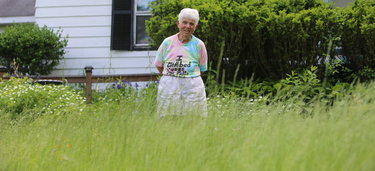Ellen Howie understands the consequences of care
ALTAMONT — When she hears something that intrigues her, Ellen Howie takes action.
Early one Sunday morning, she heard a broadcast on National Public Radio about No Mow May.
“It captured my imagination,” says Howie in this week’s Enterprise podcast. “And I thought, ‘Well, that’s easy.’”
As she talked to The Enterprise last Friday, she likened her lawn to a prairie or to undulating ocean waves. Howie named the many wildflowers flourishing there and declared, “I just think it’s beautiful.”
Howie lives at the end of Prospect Terrace so her neighbors have not been bothered by her wild lawn, she says. She revels in seeing new flowers as she walks to her compost pile.
Her husband, Dick Howie, who died a year ago, on June 2, used to love to be outdoors, mowing their lawn. “He was quite a particular man and liked things orderly,” says Howie. “On the other hand, I’m not particular. I’m not very orderly …. I like the wild things.”
The Howies were happily married for 63 years. They met in the Ramsey High School band; she was a freshman, playing the French horn while he was a junior who sat nearby, playing the trombone.
No Mow May, which encourages people not to mow their lawns during the month of May so as to increase plant diversity as well as nectar for pollinators, was launched by the charity Plantlife in Great Britain in 2019. It has caught on in many places in the United States with some entire cities signing on.
Howie, who will soon turn 85, is the daughter of an organic gardener. Her father kept a victory garden during World War II and her mother was a rosarian, “which means she loves rose bushes,” says Howie.
Howie has a deep view of each person’s importance in saving the planet that goes beyond growing her lawn or keeping a compost pile to make her refuse into fertilizer.
She cites the book “Choosing Earth” by Duane Elgin, which deals with many of the challenges now facing humanity — not just climate change and the exhaustion of resources but also social justice and the threat of authoritarianism.
Howie has spent the better part of her life working with the Institute of Cultural Affairs, which was founded after World War II with the mission of building a just and equitable society in harmony with the Planet Earth.
Because of Dick Howie’s work, when the Howies’ children were young, the family moved frequently and, while living in Philadelphia and Baltimore, lived communally as part of an Institute of Cultural Affairs program. Finances were shared as were household duties.
“We’re involved in human development, in encouraging people where they are to do what they can do,” said Howie.
She described Elgin as a colleague of many years and said he is now writing a book on the wisdom of indigenous people.
The focus, she said, is “What do we do that is going to be good for our children’s children’s children — seven generations from now?”
The Seneca people in western New York, Howie said, giving an example, are now attempting to protect and preserve their own language so that it lasts.
The focus, Howie said, is to ask, “What can we do to make a difference with this home of ours on Planet Earth? And how do we work together to do that?”
Howie said she feels fortunate to live in Altamont. Because of village planning, she said, there are parks and gardens to enjoy and there are sidewalks for people to walk on and stay connected.
“It seems like the whole village is assisted living for me,” said Howie who, because of her diminishing eyesight, stopped driving but is never without a needed ride.
The work of the Institute of Cultural Affairs was getting people to gather and share their vision for their community, Howie said. She described the process: “Underneath that exploring … What are the contradictions? … What’s stopping that? … And then onto saying, well, what are the challenges given these contradictions?”
A community would then come up with a timeline to meet the challenges. “One part of this town meeting model has to do with a song story workshop …,” said Howie. “Writing a song about a community and creating a symbol. It was quite exciting.”
For instance, one of the things that came out of the community meeting in Troy was Joseph’s House and Shelter, which is still in existence today, said Howie.
In her work with the institute, Howie was able to travel the world — from South America to Europe to Africa. She vividly recalled the World Council of Churches meeting in Kenya in 1975, which she went to as a registered visitor.
As with the No Mow May initiative, Howie heard about becoming a registered visitor on the radio and decided to apply. She lived in a village on the outskirts of Nairobi and remembers the market filled with wares brought from people who lived in many tiny villages.
“I’ve kind of lived a charmed life,” said Howie.


